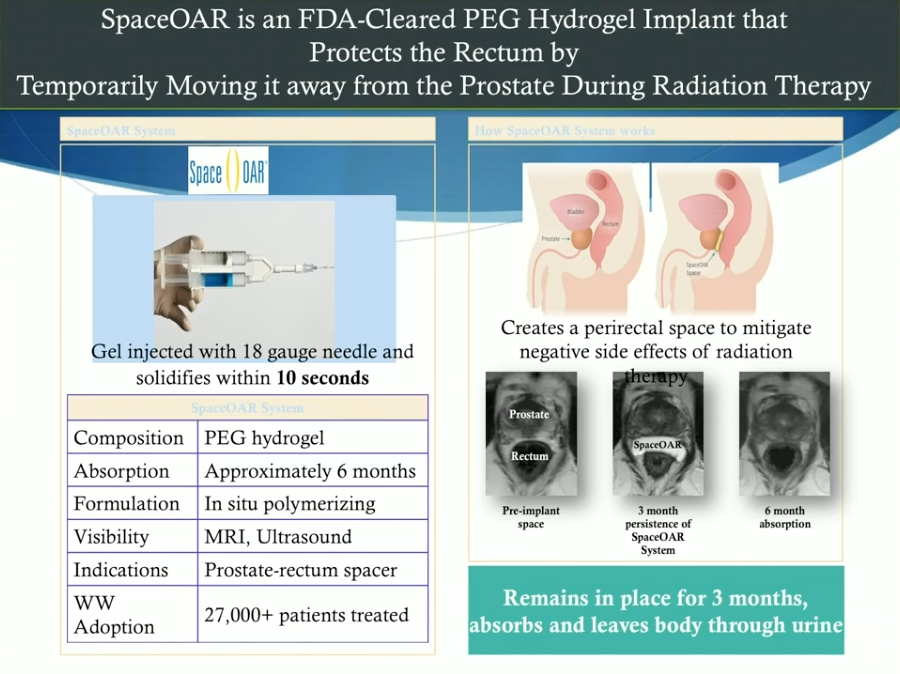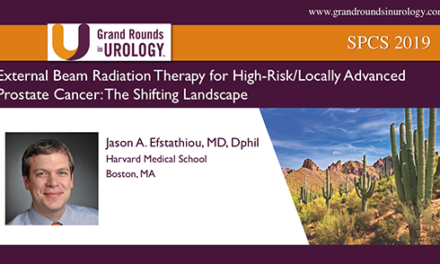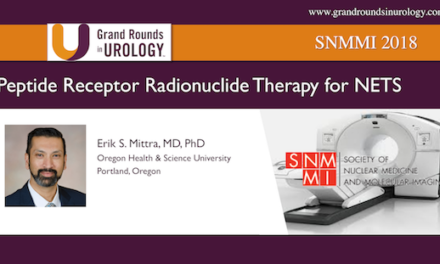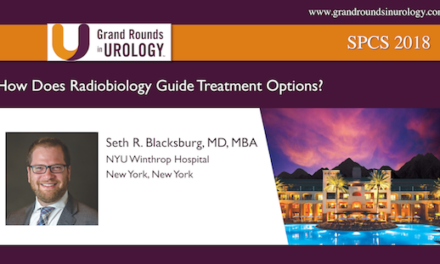Steven E. Finklestein, MD, presented “Emerging Indications for a Novel Absorbable Hydrogel Spacer: A 2018 Review” during the 27th Annual Perspectives in Urology: Point Counterpoint on November 9, 2018 in Scottsdale, Arizona.
How to cite: Finklestein, Steven E. “Emerging Indications for a Novel Absorbable Hydrogel Spacer: A 2018 Review” November 9, 2018. Accessed [date today]. https://dev.grandroundsinurology.com/emerging-indications-for-a-novel-absorbable-hydrogel-spacer-a-2018-review/
Emerging Indications for a Novel Absorbable Hydrogel Spacer: A 2018 Review – Summary:
Steven E. Finkelstein, MD, FACRO, describes how hydrogel spacing is becoming standard of care for prostate cancer radiotherapy. He reviews the clinical investigations of adjacent prostate indications, as well as indications in other organs throughout the body, for this technology.
Abstract:
Hypofractionated radiation therapy is standard of care for treating prostate cancer. However, at high doses, it results in gastrointestinal tract side effects. Due to proximity to the prostate, delivering a radiation dose to the rectum or the organ at risk (OAR) is inevitable unless prevented. A possible solution to this problem is the use of pegylated (PEG) SpaceOAR Hydrogel to create space between organs.
This not only significantly protects the rectum from radiation, but allows for administration of higher doses and the acceleration of treatment. Additionally, it provides an advantage by operating as a transperineal, not transrectal, injection.
A pivotal definitive external beam radiation therapy (EBRT) study demonstrated that using SpaceOAR resulted in 74% less rectal radiation, 75% less late rectal toxicity, a creation of a 1.3 cm space, as well as long-term quality of life (QOL) benefits. No other randomized trial has identified such an improvement in erectile dysfunction and sexual QOL. Over 500 centers have utilized space OAR in over 27,000 procedures. Furthermore, it has emerging uses in all forms of prostate radiation. Current clinical trials, such as the NRG GU 005 and COMPPARE trials, allow the use of SpaceOAR in the same way as a rectal balloon.
Most exciting are the potential implications of this technology. The ongoing POTEN-C study investigates the sexual QOL of patients undergoing ultra-hypofractionation therapies. Currently, three studies are researching the effect of SpaceOAR with salvage post-prostatectomy. Also, a study from the Medical University of South Carolina described how SpaceOAR can aid prostatic cryoablation.
Hydrogel technology is rapidly becoming standard of care for prostate cancer radiotherapy and may have potential new indications to other organs throughout the body.
About Perspectives in Urology: Point Counterpoint
Perspectives in Urology: Point Counterpoint (PCP) is an annual CME-accredited conference devoted to discussing and debating the latest topics in men’s health, general urology, and genitourinary cancers. The conference’s format includes more than didactic lectures. It also includes debates, point-counterpoint discussion panels, and unique case-based presentations. Dr. Finkelstein presented this lecture during the 27th PCP in 2018. Please visit this page in order to register for future PCP meetings.
ABOUT THE AUTHOR
Steven E. Finkelstein, MD, FACRO, is a radiation oncologist with Florida Cancer Affiliates in Panama City, Florida. He has served as a Co-Chair on the NRG Immunotherapy Committee, Co-Chair of the 2018-2019 ACRO Scientific Program Committee, and Chair of the SWOG Radiation STG Committee. He currently serves on the Board of Chancellors for ACRO. Dr. Finkelstein has also served as National Director of Translational Research Consortium (TRC), the cutting-edge therapy arm of 21st Century Oncology in Scottsdale, Arizona. Inspired by his grandmother, a cancer patient, he became a dedicated cancer surgeon who found that radiation therapy could sometimes do for his patients what surgery could not. Dr. Finkelstein received his medical degree from the University of Michigan Medical School. He served a residency in General Surgery at Washington University in Saint Louis, Missouri, and was Chief Resident in Radiation Oncology at the Moffitt Cancer Center in Tampa, Florida. Dr. Finkelstein also served fellowships in Biologic Immunotherapy, Clinical Cancer, and Surgical Oncology at the Surgery Branch of the National Cancer Institute in Bethesda, Maryland. He is a member of the American College of Radiation Oncology, the American Medical Association, the American Society of Clinical Oncology, the American Society for Therapeutic Radiology and Oncology, the Radiological Society of North America, and the Radiation Therapy Oncology Group.






